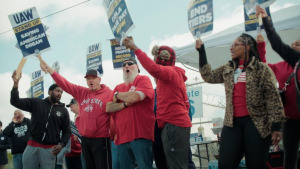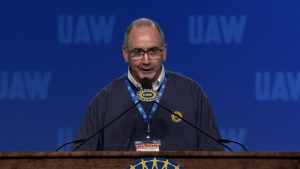
Future of electric vehicles looms over negotiations in autoworkers strike
With the UAW strike now in its fourth week, EVs and their potential impact on job security have become central to union negotiations with the automakers.

With the UAW strike now in its fourth week, EVs and their potential impact on job security have become central to union negotiations with the automakers.

In just a few months, Shawn Fain has gone from obscurity to one of the most visible leaders in America, demanding that his workers get more concessions from the Big Three automakers after two decades of givebacks.

Additional walkouts will take place at noon Friday without serious progress in contract talks, the United Auto Workers union said.

In a statement, UAW President Shawn Fain called the move “a shameful, barely-veiled threat by Ford to cut jobs” at a plant that’s not open yet.

UAW President Shawn Fain has not said which plants would be affected next—the union’s stated strategy is to “keep the companies guessing.”

UAW President Shawn Fain said workers at more factories will join those who are now in the fifth day of a strike at three plants.

In an online address to union members, United Auto Workers President Shawn Fain said General Motors, Ford and Stellantis have raised their initial wage offers, but have rejected some of the union’s other demands.

Stellantis, which employs about 7,000 people at plants in Kokomo and Tipton in Indiana, released no details of its offer Monday.

About 146,000 U.S. auto workers are set to go on strike this week if General Motors, Ford and Stellantis fail to meet their demands.

The offer comes just a week before the UAW’s national contracts with GM, Stellantis and Ford expire, and even though both sides are far apart, it’s a sign of movement on economic issues.
A strike against all three major automakers—General Motors, Stellantis and Ford—could cause damage not only to the industry as a whole but also to the Midwest economy, and could lead eventually to higher vehicle prices.

The United Auto Workers union says it has filed unfair labor practice complaints against Stellantis and General Motors for failing to make counteroffers to the union’s economic demands.

If it doesn’t have contracts with General Motors, Ford and Stellantis by the Sept. 14 deadline, the UAW could strike all three simultaneously—something it has never done.

The union is seeking more than 40% general pay raises over four years, restoration of pensions for newer hires, cost-of-living increases, an end to wage tiers, and other benefits.
The United Auto Workers union will present a long list to General Motors, Ford and Stellantis when it delivers economic demands to the companies this week, the union’s president says.

As the industry undergoes a historic transition from internal combustion engines to EVs, the UAW sees this year’s contract as an opportunity to ensure representation in the industry’s jobs of the future.

Indiana native Shawn Fain, who took office in March after workers voted to sweep out most of the union’s old leadership, listed grievances with Stellantis, General Motors and Ford in a wide-ranging talk Friday.
A court-appointed monitor declared challenger Shawn Fain the winner over incumbent Ray Curry. Fain’s slate of candidates won control of the big union, as workers rejected most incumbents in the wake of a bribery and embezzlement scandal.

Stellantis employs about 7,000 people at plants in Kokomo and Tipton in Indiana.
In the first-ever direct election of a UAW president in the union’s 88-year history, Ray Curry, who started on the assembly line at a truck plant in North Carolina, faces Shawn Fain, 54, who began as an electrician at a Chrysler metal casting plant in Kokomo, Indiana.